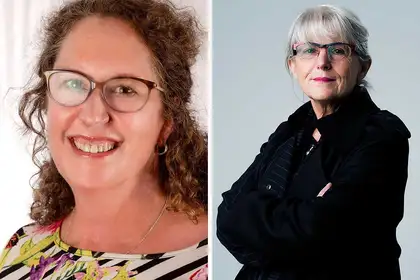
Dr Riley and Professor Noble.
Two Massey University researchers have received more than $129,000 in funding to undertake a two-year exploratory study on teaching and learning.
Dean research Associate Professor Tracy Riley and Distinguished Professor Anne Noble from the School of Art will work with teachers from Newlands and Avalon Intermediate Schools in the Wellington region, to explore how teachers tailor their response to pupils of differing learning ability and background.
The project, which utilises mixed method action research techniques, will see a colony of bees installed in an observation hive, known as an Apiscope, in the schools. Researchers will look at the potential of the hive to create authentic learning experiences across many areas of the curriculum.
Their project was one of eight to receive funding as part of the Teaching and Learning Research Initiative, which awarded more than $1.3 million in funding last month to projects that aim to improve outcomes for learners.
Dr Riley says there is a huge potential for the Apiscope. “There is the potential to explore big concepts like sustainability, patterns and relationships, and it’s also an opportunity to involve new kinds of communities in the life of the school.”
The 10-year-old project is the brainchild of University of Orléans physicist Dr Jean-Pierre Martin who has overseen the installation of 80 Apiscopes in schools throughout France. Dr Martin and Professor Noble initiated the New Zealand Apiscope project while working together on an exhibition project in France three years ago.
“We know from Jean-Pierre’s work in France and anecdotally that children of all ability levels, gifted and those with learning challenges, enjoy the bees. I want to document how that works and how teachers use it to meet different needs. We can learn what inspires children's curiosity and use their questions and experience of wonder as learning opportunities,” Dr Riley says.
Professor Noble has been a beekeeper for seven years and bees have been the focus of multiple collaborative art/science projects during this time. “My work focuses on the risks to our environment caused through the loss of biodiversity and the importance of nurturing ecological intelligence through trans-disciplinary art and education projects,” she says.
The Teaching and Learning Research Initiative has been operating since 2003. To date, 145 projects have been funded. The fund has an annual budget of $1.5 million, available for projects that run for one to three years.